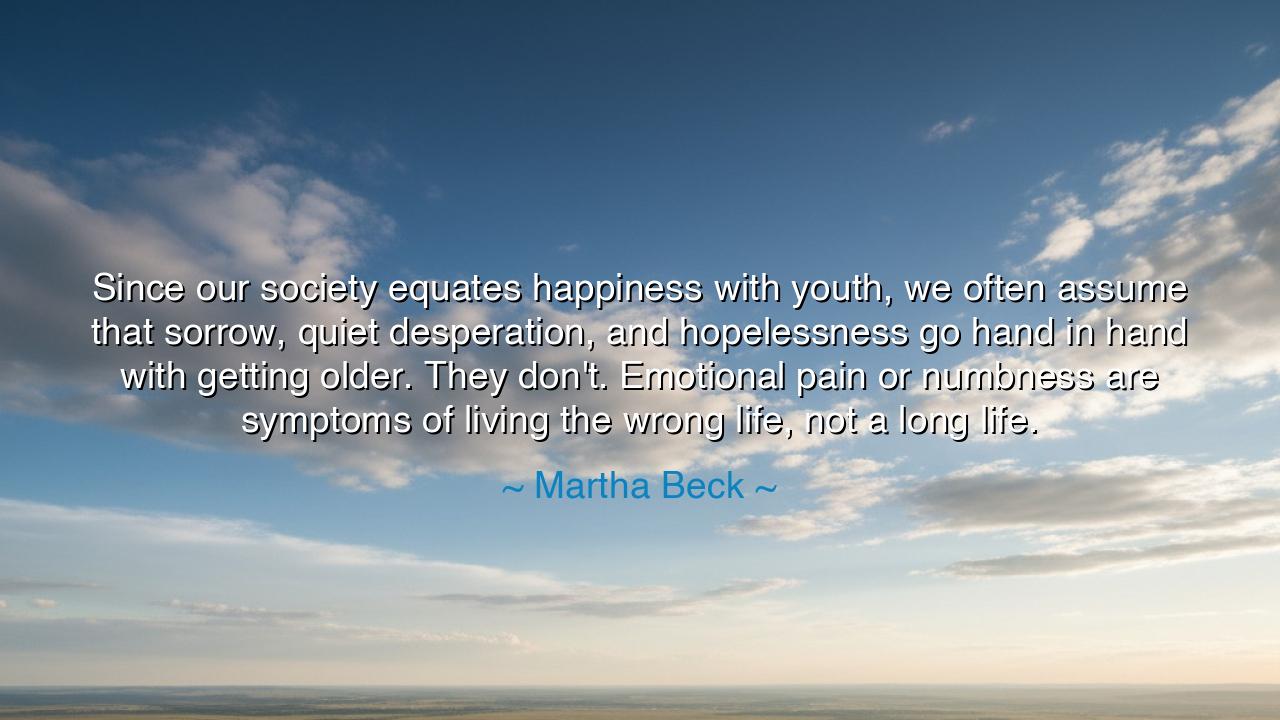
Since our society equates happiness with youth, we often assume
Since our society equates happiness with youth, we often assume that sorrow, quiet desperation, and hopelessness go hand in hand with getting older. They don't. Emotional pain or numbness are symptoms of living the wrong life, not a long life.






“Since our society equates happiness with youth, we often assume that sorrow, quiet desperation, and hopelessness go hand in hand with getting older. They don't. Emotional pain or numbness are symptoms of living the wrong life, not a long life.” Thus spoke Martha Beck, a seeker of truth in the modern age — a teacher of the heart, whose words pierce through illusion like light through fog. In this declaration, she defies one of the greatest myths of our time: that age is the enemy of happiness, and that growing older is a slow descent into despair. Beck reminds us that the withering of joy is not the destiny of the old, but the consequence of living in disconnection — from truth, from passion, from the divine call within the soul.
In every era, people have sought the elixir of youth, believing that happiness is tied to beauty, energy, and freedom from decay. But this belief is an illusion — a mirage born of fear. The ancients knew better. They taught that wisdom, not youth, is the crown of a life well-lived. Yet in our modern haste, we have traded reverence for experience with worship of appearances. The marketplace sells us creams for the skin and dyes for the hair, but it cannot restore the spirit. For what ages a person most is not the passing of time, but the weight of unlived truth — the years spent denying one’s heart, wearing masks, and serving the wrong masters.
Martha Beck, who walked through her own wilderness of suffering, speaks from experience. A scholar turned spiritual teacher, she once lived the “successful” life the world praised — until her heart rebelled against its falsehood. Through loss and awakening, she discovered that emotional pain and numbness are not the companions of age, but the signals of a life unaligned with one’s purpose. To feel dead within while living outwardly well is not a sign of years, but of estrangement from the soul’s calling. In this, her words echo the ancient wisdom of Socrates, who warned that “the unexamined life is not worth living.” For to live wrongly — without authenticity, compassion, or joy — is to wither long before the body does.
Consider the life of Leonardo da Vinci, whose spirit burned with wonder until his final breath. Though his hair silvered and his hands trembled with age, his curiosity never dimmed. He painted, studied, invented, and dreamed until the end. His heart was not bound by years, for he lived according to his inner fire — the truth of his being. The spark of purpose within him was the fountain of happiness. Thus he proved what Beck declares: that joy is not found in the smoothness of skin but in the fullness of the soul. The body may age, but the spirit, when nourished by truth, remains forever young.
There is a tragic irony in modern life. We chase youth — its speed, its glamour, its thrill — yet neglect the very things that keep the heart alive. We silence our passions for fear of judgment. We trade freedom for comfort, authenticity for acceptance. And then, when years pass and the mask grows heavy, we call our weariness “old age.” But it is not time that has wearied us — it is inauthentic living. To live wrongly is to age the soul; to live rightly is to renew it each dawn.
The cure, as Beck teaches, lies in awakening. To heal from emotional numbness, one must return to honesty — to the life that stirs the heart rather than pleases the crowd. This may mean changing one’s work, one’s habits, even one’s companions. It may mean confronting fear, loss, or grief. But beyond that trial lies renewal. The one who lives according to truth discovers that peace and joy are not reserved for youth, but bloom wherever the soul is honest. For happiness is not a memory of the past; it is the fruit of present authenticity.
Therefore, my children, learn this: fear not the passing of years, but fear the passing of days unlived. Do not measure life by youth, but by aliveness. Every dawn is an invitation to begin again — to listen to the quiet voice within and answer it with courage. Seek truth over approval, meaning over success, and passion over comfort. When you walk in harmony with your spirit, no matter your age, you will feel the radiance of eternity within you.
So remember the words of Martha Beck: “Emotional pain or numbness are symptoms of living the wrong life, not a long life.” Let this wisdom be a lantern upon your path. Live rightly — with integrity, wonder, and love — and age will lose its power to frighten you. For the one who lives in truth does not grow old; they simply grow deep, radiant, and free.






AAdministratorAdministrator
Welcome, honored guests. Please leave a comment, we will respond soon